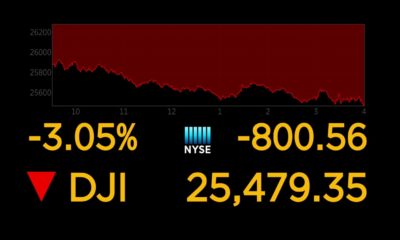ECONOMY
US National Debt Surpasses $22 Trillion For First Time In US History As Experts Warn Of Ripple Effects
The gross national debt has surpassed $22 trillion for the first time in the U.S. history as of Feb. 11, according to a Treasury Department report Tuesday.
U.S. national debt soars to a record $22 trillion https://t.co/8jlXVZHO13 pic.twitter.com/Jak5cOqxET
— Bloomberg (@business) February 12, 2019
“This milestone is another sad reminder of the inexcusable tab our nation’s leaders continue to run up and will leave for the next generation,” said Judd Gregg and Edward Rendell, Co-Chairs of the debt watchdog group Campaign to Fix the Debt.
“The fiscal recklessness over the past years has been shocking, with few willing to step up with a real plan,” they said. “We need responsible leadership to fix the debt, not a worsening of partisanship.”
The Hill reports:
Deficits have soared under President Trump, spurned on by the GOP tax law, bipartisan spending increases, and the forward momentum of mandatory spending programs such as Medicare and Social Security. Tuesday’s estimate put the total outstanding public debt at $22.013 trillion,
The Congressional Budget Office projected that annual deficits would surpass $1 trillion a year starting in 2020 assuming current spending and revenue policies remain in place.
Budget watchdogs are warning that soaring levels of debt can inhibit future economic growth.
“Our growing national debt matters because it threatens the economic future of every American,” said Michael A. Peterson, CEO of the Peter G. Peterson Foundation, a budget watchdog group.
“As we borrow trillion after trillion, interest costs will weigh on our economy and make it harder to fund important investments for our future. We already pay an average of $1 billion every day in interest on the debt, and will spend a staggering $7 trillion in interest costs over the next decade,” he added.
The CBO has projected that the costs of servicing the debt will surpass defense spending by 2025.




















